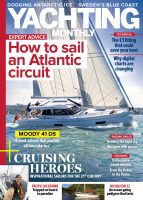The Chief Inspector of Marine Accidents wants a cross industry forum to be formally created for the nationwide management of personal watercraft in the UK
A consistent approach to the management of personal watercraft around the UK has been recommended by the Chief Inspector of Marine Accidents after a fatal collision between a RIB and a personal watercraft.
Andrew Moll said while many harbour and local authorities ‘manage their waters to provide safe areas for all water users, there is an inconsistency of management around the UK coast, which can lead to conflicted interests and confusion’. This is ‘detrimental’ on the efforts being made to deter irresponsible riders.
He has now recommended to the RYA and the Personal Watercraft Partnership that a cross industry forum be formally created for the nationwide management of personal watercraft. This will include the adoption of nationally consistent launch site signage relevant to personal watercraft and consideration of a nationwide voluntary registration scheme.
Moll said personal watercraft are ‘high performance machines, not toys’ and riders should complete ‘an appropriate training course’.
A Marine Accident Investigation Branch (MAIB) report into the accident on the Menai Strait in Wales on 7 August 2020 found that neither the helm of the RIB Rib Tickler or the personal watercraft driver had the ‘necessary level of skill and knowledge’ to carry out manoeuvres at high speed.

The accident happened just past the Menai Suspension Bridge in north Wales
A ‘misguided confidence in their abilities’ had meant no training had been undertaken.
A passenger in the RIB, Jane Walker died after she was struck by the personal watercraft, suffering injuries that were ‘essentially unsurvivable’.
The RIB and personal watercraft collided because the RIB’s helm turned into the path of the personal watercraft as its rider jumped the RIB’s wake. Neither the RIB helm nor the personal watercraft rider left sufficient safe distance between the two craft, given the speeds involved.
The MAIB report also found that there was ‘insufficient local governance’ of the Menai Strait by the Isle of Anglesey County Council, due to a ‘lack of resources, risk assessment for leisure users, or powers to manage their waterspace.’ It has since engaged a maritime specialist to conduct a review into its management of the Menai Strait.
Continues below…
Reclassification of jet skis under consideration
A public consultation on the classification of jet skis and other recreational and personal watercraft ends on 1 November 2021
Migrants at sea: the dos and don’ts of helping those in distress
How can you help those in distress without endangering your vessel or breaking the law? Elaine Bunting investigates
Biodiesel warning: boat owners advised to take action
Sailors are reporting increased filter plugging from a new contaminant, carboxylic acid, or soap, forming as a result of Fatty…
The UK’s Department of Transport wants to reclassify personal watercraft, speed boats and other recreational watercraft to make users subject to the same laws and safety obligations as those who operate ships. The findings of a public consultation into the plans are still being reviewed ahead of any announcement.
The RYA is supporting plans for a review of the relevant legislation and although it has already initiated a cross industry forum on personal watercraft, it welcomes the recommendations of a more formalised approach to this.
It already works closely with the Personal Watercraft Partnership, and has assisted the organisation to update and publish a personal watercraft management guide for local harbours and authorities which provides advice on all aspects of the management including slipways and charges for access to the water.
Its director of training and development, Richard Falk said it favoured education rather than mandatory training or licensing to address the ‘small minority’ of riders who behave recklessly.

The RYA says most people undergo some training
He said in the US where there is mandatory licensing for pleasure craft in all but two states, boat accidents are proportionally between 10-20 times higher than in the UK.
‘The UK is the only country in the world that has such a diverse range of boating courses, over 100, with many of these courses having multiple levels. In the UK, water users for the most part choose to undertake additional training beyond the entry levels courses; evidence from around the world clearly indicates if there was mandatory training and licensing then that would change. It develops a culture where people have the mandatory ticket and they think that is all they need,’ he added.
The RYA has also updated its Personal Watercraft and Start Powerboating handbooks to better reflect some of the issues highlighted in the MAIB report including the importance and conduct of the over-the-shoulder pre-manoeuvre check; how to safely operate in company with other craft, with particular
focus on communication and safe distances; the oversight of inexperienced/untrained helms in an informal setting; crossing waves and wakes, with particular focus on control of personal watercraft and safe distances from vessels creating wake.
It will also disseminate to their members a summary of the safety messages from this accident prior to the start of the 2022 boating season.
Enjoyed reading Calls for UK-wide approach to personal watercraft management?
A subscription to Yachting Monthly magazine costs around 40% less than the cover price.
Print and digital editions are available through Magazines Direct – where you can also find the latest deals.
YM is packed with information to help you get the most from your time on the water.
-
-
- Take your seamanship to the next level with tips, advice and skills from our experts
- Impartial in-depth reviews of the latest yachts and equipment
- Cruising guides to help you reach those dream destinations
-
Follow us on Facebook, Twitter and Instagram.







